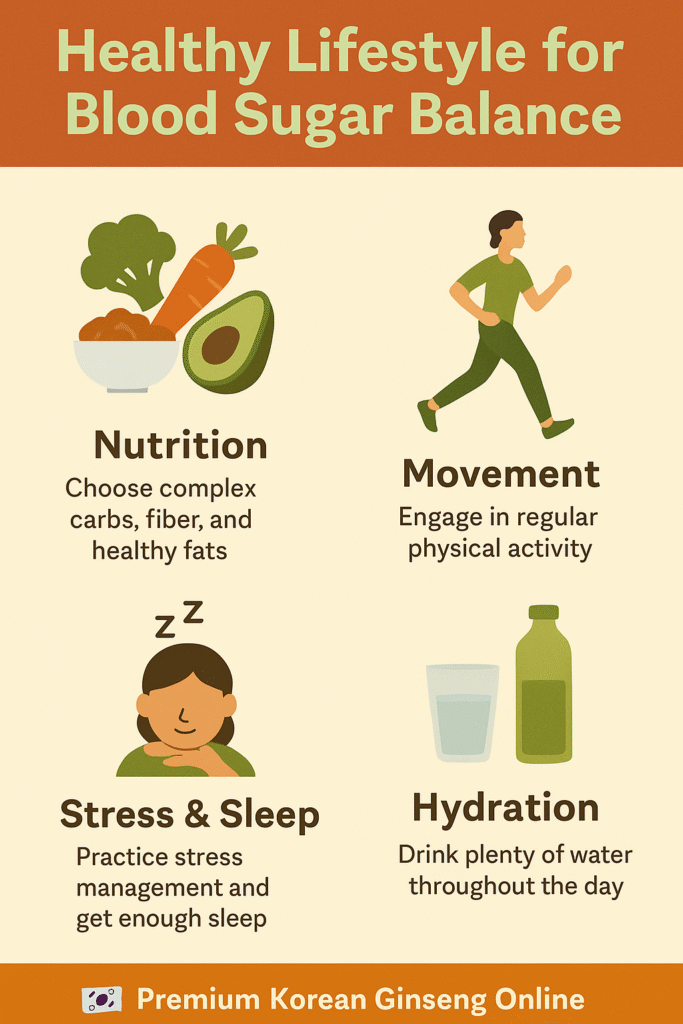🍃 Understanding the Modern Diabetes Challenge
Diabetes is one of the fastest-growing health concerns worldwide. According to the World Health Organization (WHO, 2023), more than 422 million people live with diabetes, and the number continues to rise — largely driven by sedentary lifestyles, processed foods, and chronic stress.
High blood sugar doesn’t just affect energy levels. Over time, it damages blood vessels, the heart, kidneys, eyes, and nerves. Yet the good news is — your daily lifestyle choices have the power to make a difference.
By combining mindful nutrition, physical activity, and balanced rest, it’s possible to maintain stable glucose levels and promote lasting wellness.
🥗 Nutrition: The First Line of Defense
What you eat shapes how your body manages blood sugar.
Here are science-backed dietary principles to help keep it balanced:
- Choose complex carbohydrates – Opt for whole grains, brown rice, and oats over refined sugar and white flour. These release glucose slowly, keeping your energy steady.
- Add fiber-rich foods – Vegetables, legumes, and seeds help regulate blood sugar absorption.
- Healthy fats matter – Include avocado, olive oil, and nuts to improve insulin sensitivity.
- Avoid sugary drinks – Beverages like soda and energy drinks can cause dangerous spikes in blood glucose.
(Source: American Diabetes Association, 2024)
🚶♀️ Movement: A Natural Glucose Regulator
Exercise is one of the most powerful non-pharmaceutical tools for diabetes management.
Even 30 minutes of daily activity — such as walking, cycling, yoga, or swimming — helps your muscles use glucose efficiently and enhances insulin response.
Regular movement not only reduces blood sugar but also boosts circulation and heart health, helping prevent long-term complications.
If you’re new to exercise, start small:
- A 10-minute walk after each meal can lower post-meal glucose.
- Light stretching or yoga before bed improves metabolic recovery.
(Source: Harvard Health Publishing, 2023)
😌 Stress & Sleep: The Hidden Influencers
Chronic stress triggers the release of cortisol, a hormone that raises blood sugar. Similarly, sleep deprivation disrupts insulin regulation.
Simple lifestyle adjustments can help:
- Practice deep breathing or mindfulness meditation daily.
- Maintain a consistent sleep schedule (7–8 hours each night).
- Reduce screen time before bed to improve melatonin production.
(Source: National Institute of Diabetes and Digestive and Kidney Diseases)
💧 Hydration & Herbal Support
Water plays a crucial role in flushing out excess glucose through urine. Aim for at least 2 liters a day.
Some natural herbs — like cinnamon, fenugreek, and Korean ginseng — have been studied for their supportive role in maintaining balanced blood sugar. When used responsibly as part of a healthy lifestyle, they can complement a balanced diet and exercise.
(Note: Always consult your healthcare provider before adding any supplements.)
🌿 The Bigger Picture: Lifestyle Over Medication
Modern science increasingly emphasizes prevention through lifestyle rather than reactive treatment. Managing blood sugar isn’t just about numbers — it’s about sustaining energy, focus, and joy in daily life.
By making gradual, consistent improvements in how you eat, move, sleep, and manage stress, you’re not only controlling diabetes but reclaiming your vitality and freedom.
🇰🇷 Premium Korean Ginseng Online Shop







